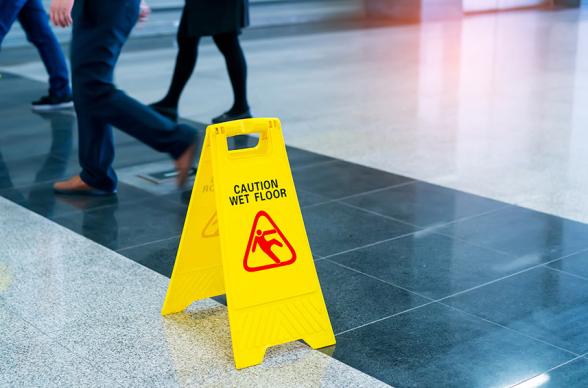Do I need public liability as a sole trader?
For a sole trader, public liability insurance can be a key consideration. Working independently can affect your professional responsibilities, which could bring certain legal risks. Whatever you do, learn how to work out if you might need public liability cover with our FAQ guide.
Online quote in 5 minutes
Get a quote
What is public liability insurance – and can it help a sole trader?
For a sole trader, public liability works to help self-employed professionals counter some of the risks that can come with doing business.
Having public liability insurance means you can be covered for the cost of claims, including amounts you may be required to pay as compensation and your legal defence costs. The idea is to help a sole trader manage the risk of unexpected costs.
Do I need public liability insurance if I am a sole trader?
Sole traders aren’t required by law to have public liability insurance in the UK, but it can be a helpful addition. If an issue arises, you might find it helps you cover the cost of compensation and legal fees.
The work you do as sole trader could have a direct and unexpected impact on a member of the public, a customer, or a client. You might then find you need public liability insurance to protect your business against claims for injury or damage caused by your work – without cover, you may need to foot the bill yourself.
Do I need public liability insurance if I am a sole trader who works from home, or if I travel?
Whether you work from home, in an office, or a public space, if there is an accident related to your work that causes harm, you could be held accountable. For example, if you’re an electrician and somebody trips over your toolbox, or if you’re a consultant and a client’s laptop is damaged during a meeting in your home office, it could be your responsibility to put it right.
Without public liability cover, the cost of dealing with a court case has the potential to be damaging to your business and personal finances — especially as a sole trader without the protection of a large company.
What does public liability insurance cover and how can it help sole traders?
Public liability insurance can cover a sole trader for:
- Injury claims by a third party
- Property damage claims by a third party.
Working solo means most people you interact with may count as third parties. For instance, a customer would fall in this category, as would a delivery driver. However, it may also apply to other self-employed people you work alongside.
If you work as a sole trader alongside other self-employed traders – painters, designers and engineers, for example – then you could also be liable for their compensation claims.
How much does public liability insurance cost a sole trader?
Public liability insurance can cost as little as £55 per year with Hiscox* – although the exact figure will vary in line with the work you do as a sole trader, and the cover limits you select. Every sole trader’s enterprise is different, so the sector you work in can make a big difference. Read our full FAQ guide to learn more about the cost of public liability insurance and the factors to consider.
*Figures based on policies from at least 10% of our customers
What type of liability does a sole trader have?
A sole trader has unlimited liability [1] for business activities and is not considered a separate legal entity from their business. This can bring a specific set of insurance risks for sole traders – for instance, if someone sues you, there’s a chance you might need to pay for compensation with your personal finances or assets [2]. It’s one reason why some sole traders feel insurance can be an important safety net.
Are sole traders personally liable?
Yes, sole traders take personal liability for business debts and legal responsibilities. This means your actions, or inactions, could become a personal challenge and not just a business issue. Public liability insurance, therefore, may help to protect you as a sole trader as well as your livelihood and business finances.
What other insurance types could I need as a sole trader?
As a sole trader, your insurance needs may vary depending on the type of work you do and where you work from. Though public liability insurance can help if a third party claims for injury or property damage, other types of insurance may be helpful to cover yourself against multiple risks in different circumstances.
A sole trader might add:
- Professional indemnity insurance
- Cyber and data insurance
- Personal accident insurance.
If you offer professional advice or consultancy, it may be worth considering professional indemnity insurance alongside public liability. This can protect you if a client makes a claim against you for making a professional mistake, alleged negligence or offering advice that led to them making a financial loss.
While you may operate your business as a sole trader, if you employ a member of staff, or several, it could be a legal requirement (external link)[3] for you to have employers’ liability cover. This covers you for claims of injury or illness caused by the employee’s work for you. If you are the sole employee of the business, however, this cover will not be necessary – but you might like the reassurance that personal accident insurance can bring to those with high responsibility.
In addition to this, if your work requires you to handle client data or websites, then it may also be worth considering cyber and data insurance.
Learn more about what a sole trader could need with our FAQ, or explore other sole trader insurance options.
[1] https://www.bbc.co.uk/bitesize/guides/z4br87h/revision/
[2] https://www.investopedia.com/terms/u/unlimited-liability.asp
[3] https://www.gov.uk/employers-liability-insurance
Tell us about your business – we’ll build your business insurance quote and help you explore any other insurance needs.
Start my quoteRelated guides & FAQs
Disclaimer:
Our FAQ pages provide general information and background around the topic covered. FAQ pages are reviewed and monitored periodically by our insurance experts. But the content is not intended to be read as advice and any material is for general information purposes only. If you would like advice for any content, please seek professional assistance.


